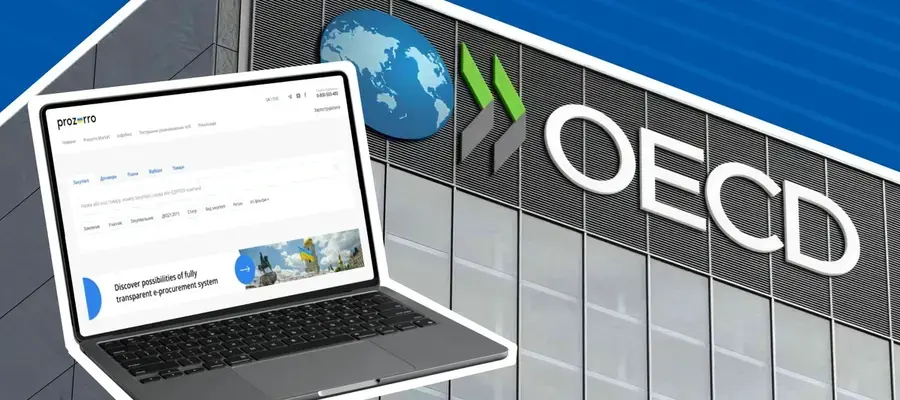
The Organisation for Economic Cooperation and Development (OECD) highlighted Ukraine’s progress in reforming its public procurement system and the continuous improvement of the electronic procurement system Prozorro. According to the results of the fifth round of monitoring under the Istanbul anti-corruption Action Plan, Ukraine scored 66 out of 100 points in the area of “Integrity in Public Procurement” - a high level of compliance with OECD standards.
Among the key achievements is the comprehensive enhancement of the Prozorro electronic public procurement system, supported by the World Bank and other international partners in 2023–2024. The system fully meets OECD criteria. In particular, procurement through the electronic system is mandated by public procurement legislation and is accessible to all interested parties in practice. It covers all stages of the procurement cycle - from planning and contracting (including direct contracts) to appeals and decisions, as well as contract administration and amendments. Information on procurement plans, tender documentation, evaluation results, contracts, prices, appeals, and contract implementation is public, free of charge, and available in a machine-readable format.
The monitoring team also noted the introduction of electronic catalogues - a convenient alternative tool for transparent procurement - and the “donor procurement” module developed by Prozorro, which allows the adaptation of processes to the rules of international partners.
Ukraine also meets other important criteria. Legislation covers procurement by state and municipal enterprises, entities of natural monopolies, and the security and defense sectors (with due regard for the protection of sensitive information). Clear conflict-of-interest rules are established by law and apply to all public officials involved in the procurement cycle (from planning to contract completion). Sanctions are regularly applied to public officials for violating conflict-of-interest rules in the public procurement sphere.
The OECD team also positively noted Ukraine’s recognition of qualified electronic signatures from EU and European Economic Area member states.
The report also outlines key directions for the further development of the public procurement system. It recommends improving mechanisms for suspension and liability for procurement-related violations, including corruption offences; extending conflict-of-interest rules to private sector participants involved in procurement; and limiting the use of non-competitive procedures, including revising the list of exceptions to open tenders.
It should be recalled that the assessment covered Ukraine’s anti-corruption and prevention system across nine key areas: anti-corruption policy, conflict of interest and asset declarations, protection of whistleblowers, business integrity, transparency in public procurement, independence of the judiciary, independence of the Prosecutor’s Office, specialized anti-corruption institutions, and liability for corruption offences.
A distinctive feature of the fifth round was the application of performance indicators defined in the monitoring methodology. The achievement of indicators was assessed using compliance criteria based on international standards and best practices, as well as recommendations provided by the OECD during the previous monitoring round. This evaluation system ensures the objectivity, consistency, and transparency of conclusions.
Information on Ukraine’s progress in anti-corruption policy, conflict of interest and asset declaration, whistleblower protection, and business integrity is available on the NACP website.
The full text of the report from the fifth round of monitoring under the Istanbul Anti-Corruption Action Plan is available via the link.
Background: the OECD Anti-Corruption Network (ACN) is a regional programme of work under the OECD Working Group on Bribery, established in 1998. Its mission is to support member countries in preventing and combating corruption through country reviews, practitioner networks, and targeted technical assistance.
The Istanbul Anti-Corruption Action Plan is a regional peer review programme launched in 2003 within the OECD ACN framework. It supports reforms through country analysis and monitoring of the implementation of recommendations promoting international best practices and standards.
The Istanbul Action Plan covers ten OECD ACN member countries: Ukraine, Armenia, Georgia, Kazakhstan, Kyrgyzstan, Moldova, Mongolia, Tajikistan, Azerbaijan, and Uzbekistan. Ukraine joined the programme in 2003 and has undergone five monitoring rounds. All previous reports are available on the ACN website.
In March 2024, the OECD published the Report on Anti-Corruption Reforms in Ukraine following the fifth round of monitoring under the Istanbul Anti-Corruption Action Plan. In 2023, Ukraine underwent a shortened review in five of the nine areas: anti-corruption policy, asset declaration, independence of the judiciary, specialized anti-corruption bodies, and liability for corruption offences. The report confirmed that Ukraine demonstrated significant progress in various areas of anti-corruption reform and integrity development.



